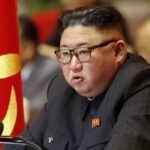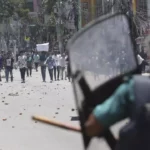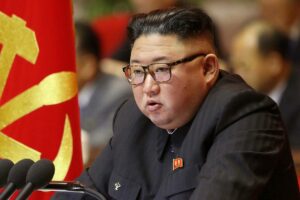Katsuji Nakazawa is a Tokyo-based senior staff and editorial writer at Nikkei. He spent seven years in China as a correspondent and later as China bureau chief. He was the 2014 recipient of the Vaughn-Ueda International Journalist prize.
There are signs of turmoil in Chinese domestic politics.
On Monday, it was announced that President Xi Jinping will not attend an upcoming summit of the Group of 20 major economies in India. Premier Li Qiang will take his place.
This will be the first time that Xi has skipped a G20 summit, to which he has consistently attached importance as China’s top leader.
A precursor seems to have been this summer’s Beidaihe meeting, the annual get-together of incumbent and retired leaders of the Chinese Communist Party at the seaside resort of Beidaihe, Hebei Province.
The informal discussions are never officially disclosed, but details of this year’s closed-door talks have begun to emerge. In short, the conclave had a significantly different feel from the previous 10 Beidaihe meetings that have taken place since Xi became general secretary of the party in 2012.
Sources said that at this year’s gathering, a group of retired party elders reprimanded the top leader in ways they had not until now. Xi later expressed his frustration to his closest aides, according to the information gathered.
Xi Jinping appears to be avoiding international conferences where China’s slowing economy might be brought up for discussion. © Reuters
This Beidaihe meeting was held without the presence of the most prominent of party elders. Former President Jiang Zemin died at the age of 96 last November, and Xi’s immediate predecessor, Hu Jintao, now 80, has seldom been seen since being unceremoniously escorted out of the Great Hall of the People at the party’s national congress last October.
These absences might have helped create a desirable situation for Xi. But the matter was not that simple.
China today is not in the best shape. Its economy is receding in ways unseen since “reform and opening-up” began in the late 1970s. The real estate sector is in shambles, symbolized by the struggles of major developer Evergrande Group. The youth unemployment rate deteriorated to such an extent that Chinese authorities this summer stopped releasing figures.
The military is mired in commotion in the wake of two top Rocket Force generals being purged, the firings coming to light in July.
Foreign Minister Qin Gang has been removed from that post for unknown reasons, with suspicions continuing to ripple through the ministry.
The turmoil has worried many of the elders who ran the party during China’s economic ascent.
Sources said that ahead of Beidaihe, party elders convened their own meeting to summarize their opinions before conveying them to the current leaders. The meeting was likely held in the suburbs of Beijing.
Afterward, only several of these elders traveled to Beidaihe to convey their consensus to the current leaders. The face-to-face meeting with the current leaders, including Xi, took place on a single day, the sources said.
The gist of the message was that if the political, economic and social turmoil continues without any effective countermeasures being taken, the party could lose public support, posing a threat to its rule.
We cannot have more turmoil, the elders pointed out.
The central figure of the elders was Zeng Qinghong, a former vice president and one of the closest aides to the late former President Jiang.
Then-President Jiang Zemin, left, is greeted by his right-hand man Zeng Qinghong during a send-off ceremony in Beijing on October 22, 2002. © Reuters
Zeng played the most important role in paving the way for Xi, once a little-known figure, to quickly take the helm of the party.
Now 84, Zeng remains influential within the party and enjoys a wide network of personal connections. Some say that in the wake of Jiang’s death, Zeng has a bigger role to play.
Thus Xi’s rough summer began. After receiving the unexpectedly harsh criticism from the elders, Xi huddled with close aides he has promoted to key posts. According to information that has begun to trickle out, Xi vented his frustration, pointing fingers at his three predecessors — Deng Xiaoping, Jiang and Hu.
“All the issues that were left by the previous three leaders are on my shoulders” he is believed to have said. “I’ve spent the last decade tackling them but they remain unresolved. Am I to blame?”
He also is believed to have told his aides that it was now their job to resolve these leftover issues.
The venting left his aides shaken, especially Premier Li, No. 2 in the party hierarchy.
Premier Li Qiang will stand in for President Xi Jinping at the G20 summit in New Delhi on September 9-10.
Li is in charge of an economy that is facing significant headwinds.
One of those headwinds is the country’s deteriorating relations with much of the outside world. Trade is sluggish, and foreign investment in the country is declining sharply.
Xi’s decision to forgo the upcoming G20 summit in India is likely an attempt to avoid losing face.
There is a possibility that China’s economy, and how it weighs on the global economy, might be discussed. Premier Li, who is in charge of China’s economy, should travel to India to address these concerns, the inner circle has likely concluded.
But the skipping of the G20 follows another no-show. In late August, shortly after the Beidaihe meeting ended, Xi failed to appear at a business forum held on the sidelines of the BRICS summit involving Brazil, Russia, India, China and South Africa, held in South Africa. His speech was read out by Chinese Commerce Minister Wang Wentao.
One take is that Xi did not attend the forum because there were concerns that he might be asked direct questions about the poor performance of the Chinese economy.
The lack of desire on both sides to make major compromises is making it difficult for President Xi Jinping to visit U.S. counterpart Joe Biden in San Francisco in November. © Reuters
Another major factor behind Xi’s G20 absence is that no breakthrough in stalled relations with the U.S. appears on the horizon. While there is hope in Washington that the visit to China by U.S. Commerce Secretary Gina Raimondo late last month served as one step toward a more stable relationship, this is not how the Chinese side sees it.
From Beijing’s standpoint, Raimondo came bearing no gifts.
With neither the U.S. nor China able to make major concessions on important economic issues, it is difficult for Xi to justify a friendly meeting with U.S. President Joe Biden. Under the current circumstances, it is unclear whether Xi will be able to travel to the U.S. in November for the Asia-Pacific Economic Cooperation forum in San Francisco. His absence from that gathering would raise even more red flags.
The butterfly effect of Chinese politics never ceases to amaze. On Thursday, days after the Beidaihe meeting is thought to have closed, former Premier Li Keqiang made his first public appearance since being forced to retire in March.
The former No. 2 was smiling broadly when he appeared at the World Heritage Mogao Caves, also known as the Caves of the Thousand Buddhas, along the ancient Silk Road in Gansu province.

Then-Premier Li Keqiang lays a wreath at a statue of Deng Xiaoping in Shenzhen, China, in August 2022. (Screenshot from CCTV)
He was greeted by fans who chanted “Ni hao [hello], premier! Ni hao!”
Li Qiang has since taken over as premier and will be heading to the G20 summit in India in Xi’s stead. But for the people at the caves, Li Keqiang was still very much their premier.
The video of Li Keqiang’s appearance was widely dispersed on Chinese social media before being deleted by authorities.
It was a symbolic event. Li Keqiang is still a popular politician, and the cheers for him at the World Heritage site were not fake.
Now retired, Li Keqiang certainly was at the gathering of elders before the Beidaihe meeting.
Xi, the man who pushed Li into retirement, was absent from public view for many days this summer, busy having to address the harsh reprimand from the elders.
Source : Assia Nikei



















